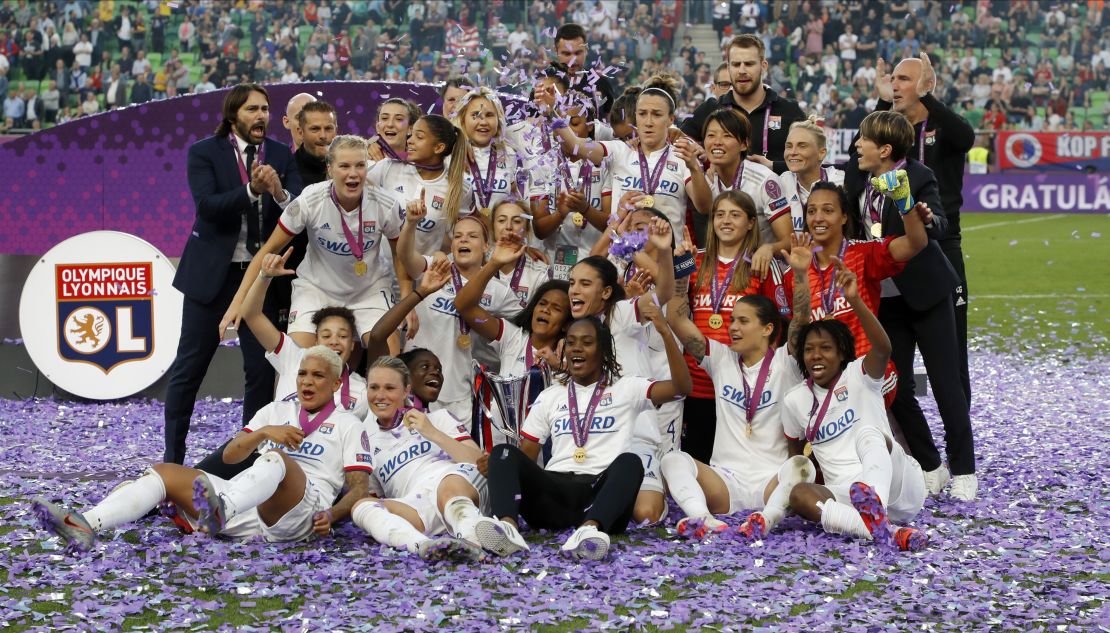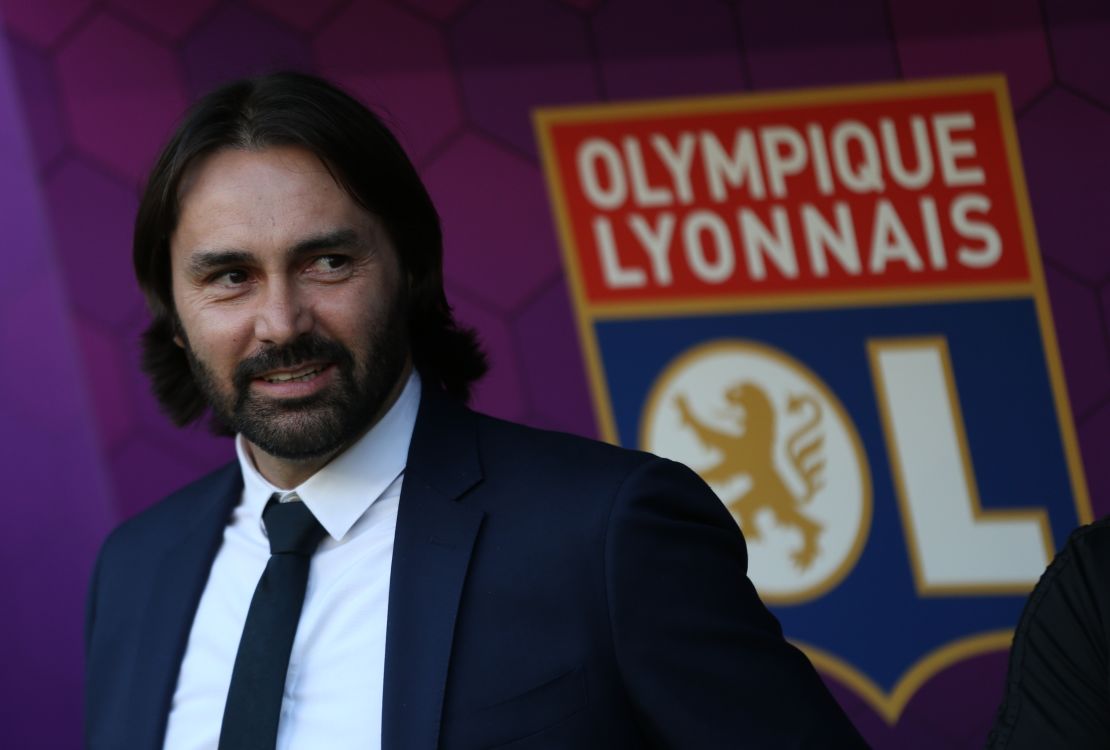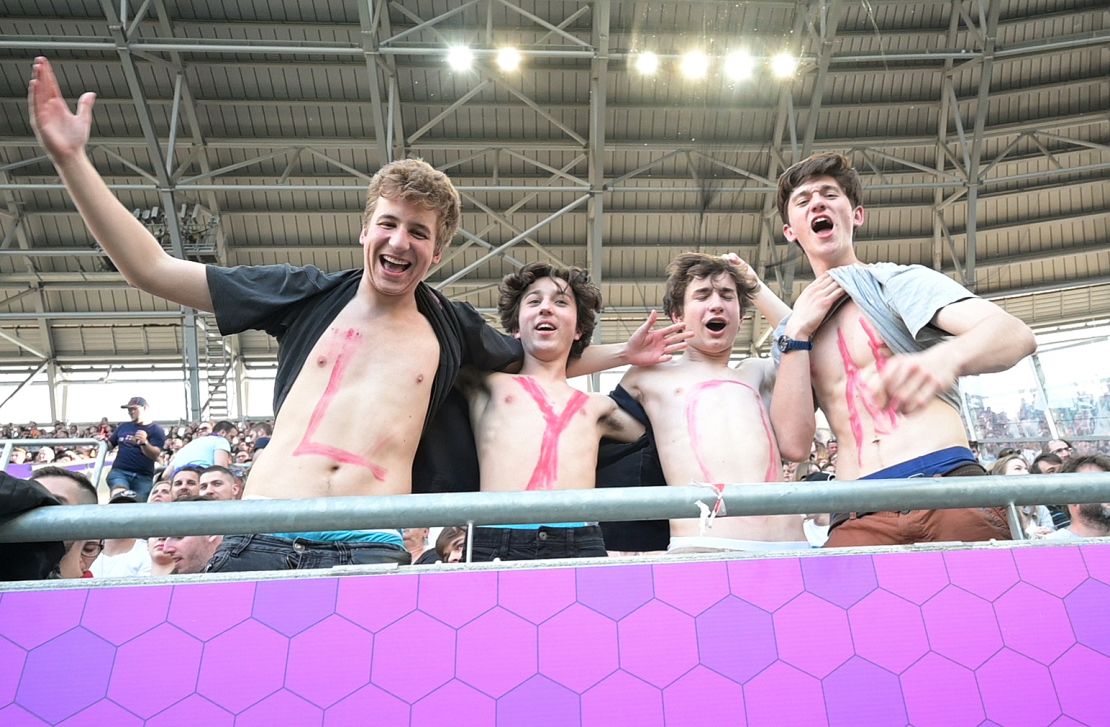Next month, Lyon’s Parc Olympique Lyonnais will be the home of the Women’s World Cup semifinals and the final. It’s unusual for a World Cup final not to be played in the host country’s capital city, but in the case of Lyon – France’s third largest city – the women’s game has found itself its own capital.
At the heart of the city’s story is Olympique Lyonnais’ women’s team. Thirteen league titles, six-time Champions League winners, the first team, male or female, to win four successive Champions League titles – no other football team can currently compare.
“Lyon has the perfect model of how you should run a modern club,” Ada Hegerberg, Lyon’s Norwegian striker and Ballon d’Or winner, told CNN Sport.
Lyon’s rise is down to one man, president Jean-Michel Aulas, who believed in his “girls” before anyone else did.
Aulas, 70, has been in charge of the club since 1987. When he took over the female section of the club in 2004, he felt it was the moment to promote the women’s game in his country.
Speaking at the club’s 59,000-seat stadium, Aulas told CNN Sport: “We are on the eve of big and fascinating events here.”
Before 2004, the local women’s football team was FC Lyon. Started in 1970, the ancestor of OL Women was already one of the greatest French clubs of the 1990s, according to Antoine Osanna, who reports on the women’s game for local newspaper Le Progrès.
“FC Lyon was competing against Juvisy. These two clubs have today disappeared, as FC Lyon was absorbed by OL and Juvisy by Paris FC,” he explained from his desk at the newspaper’s headquarters in the city.
But in the mid-2000s, Aulas decided to lend a hand to a failing FC Lyon, using what he had learned from building the men’s team to transform the women’s team into a European giant.
“In Lyon, we’re a bit of a football startup,” Aulas added.
“We’ve started on a blank page and tried to imagine what tomorrow’s women football would be and how we, through this startup adventure, could become a global company that could convince the others later on.”
From the beginning, Aulas and his team took the women’s game seriously, sparing no expense by investing when competitors were only surfing the wave. Men and women have access to the same training facilities, and the women’s team often uses the men’s stadium for big games.
“There is no women’s football or men’s football, only football and Lyon understands this better than anyone else,” said Melissa Plaza, who played for Lyon during two seasons and now holds a PhD in Sports Psychology. Plaza wrote her thesis in gender stereotypes in sports.
With a world-class performance from their striker Hegerberg – she scored a hat-trick in a 4-1 win over Barcelona – the Lyonnaises won a record sixth Champions League in nine years last month. Added to 13 league titles and eight French Cups, it makes them the most successful team in Europe.
READ: Jamaica’s remarkable journey to France 2019

Whereas France’s top men’s teams have struggled in European cup competitions, “Les Fenottes” have been confidently beating Europe’s best for more than a decade.
The secret to the team’s success? “The President, of course, but also the sum of talents that allows players, through the collective, to express themselves and win titles,” said Reynald Pedros, a former Lyon player, who has been coaching the women’s team for two years.
“It seems easy to win titles for Olympique Lyonnais, but nothing is easy. There is a lot of work to be done each time, a lot on investment, and this is why they deserve it.
“Coaching the best team in Europe and being able to recruit any players each summer is working under exceptional conditions,” added Pedros, who gladly accepts the comparison with countryman Zinedine Zidane, a Frenchman who won the Champions League three years in a row as coach of Real Madrid.
Pedros has forged a collective spirit, which is Lyon’s biggest strength.
Dounia Mesli, the founder of Coeurs de Foot, a French website specialized on the women’s game, told CNN Sport: “Lyon is more than a sum of individuality, an incredible team of women. Their rivals can’t compete on that level. PSG, for instance, does not have this collective culture yet. They are more individualistic. That might be why they fall short from winning the title.”
READ: From nuclear disaster to World Cup winners

But individuals certainly stand out for Lyon. The team’s most recognizable player, Hegerberg, was the recipient of the first women’s Ballon d’Or award last December.
In Lyon, the 23-year old – who will not play in the World Cup after she stepped away from the Norwegian national team due to frustrations with the way women’s football was treated in her country – feels at home.
“We’re so well integrated into the men’s club, you could say. It is our club, men’s and women’s teams,” she said.
Parc Olympique Lyonnais, which hosted games for the 2016 European Championship and last year’s Europa League final, is one of Aulas’ most visible achievements.
The venue is mostly used by the men’s team, but hosts the women for their most important games. In April, Lyon defeated rivals PSG 5-0 in a title-decider, setting a new French record attendance of 25,907 for a women’s league game.
READ: The female footballers who fought for change in South America

In an interview with CNN, former Arsenal manager Arsene Wenger said that attitudes towards the women’s game had changed in his homeland.
“You see that in the headlines, the women’s team gets now in the newspapers. There’s more credit, more expectation and more attendances in the stadium. It’s positive, the trend is very positive in France for women’s football,” said Wenger.
The announcement of the French squad by coach Corinne Diacre on the national evening news program was followed by more than 5 million people and made the front page of l’Equipe, the national sports daily.
“There’s a big hope in France. We have a good chance to do it. The pressure will be high,” Wenger added.
“They look quite confident and recent results against the States shows the potential is there. Of course, you have to be lucky as well to win a tournament like that, but we have a good chance.”
Around 180,000 fans are expected in Lyon for the final stages of the Women’s World Cup, including more than 17,000 Americans – figures which makes Aulas proud.
“Through what we did here with the women’s team, among others, we’ve been able to mobilize more Americans here in Lyon than on any other event, sports-related or not,” he said.
On Lyon’s red-clay main square, in the middle of the city’s so-called peninsula, home to hundreds of restaurants that contribute to the city’s culinary reputation, FIFA’s fan village will open its doors from June 26 to July 7.
Exhibitions and conferences about the women’s game will also be held, while Louis Nicollin, the late president of Montpellier Herault – the first Ligue 1 side to invest in a women’s team – will also be honored.
After France’s men lifted the World Cup in Russia last year, France could become the first country to be world champion in both the men’s and women’s edition of the competition.
Should the country achieve that feat, France could not only lay claim to being the heartbeat of women’s football but the preeminent footballing country of the era.




















